Sleepless With Spot
Dr. Russell Rosenberg
 Everyone agrees that pets offer many benefits to physical and psychological health. Pets can reduce stress, improve your outlook on life and can help motivate owners to exercise. Pets are great for many areas of your life and health, but sleep is just not one of them.
Everyone agrees that pets offer many benefits to physical and psychological health. Pets can reduce stress, improve your outlook on life and can help motivate owners to exercise. Pets are great for many areas of your life and health, but sleep is just not one of them.
As a sleep specialist, Dr. Russell Rosenberg has seen many patients who never attributed their sleep disturbance to a pet. One woman even walked out of his clinic when he suggested she keep her seven cats out of the bedroom at night!
Dr. Rosenberg has two border collies that love to sleep in his room, but they scratch, moan and sometimes whine by the door. They believe that him getting up to go to the bathroom is a signal that it is time to bark and play. There is a certain comfort to being in the same room with your pet, but sleep is too important to tolerate the disturbances they sometimes cause, especially if you are a light sleeper.
While Dr. Rosenberg doesn't want to come out and say that having your pets sleep in bed with you is bad (he's stated this before and received many "hate" emails), he does say that if your sleep is un-refreshing, or you have insomnia, or you're sleepy in the daytime and you're not sure why, first think about putting the pets out of the room. Pets can disturb your sleep without your even knowing it.
According to a survey by the Mayo Clinic Sleep Disorders Center, 53 percent of people who sleep with pets say that their animals disturb their sleep. Since animals are not on the same schedule we are, their sleep habits are very different. After sleeping all day, your kitten might think a 4 a.m. pounce on your chest is an excellent way to play. Even if your dog is exhausted after a long day at doggy daycare, he still may snore, bark in his sleep, or even hog the bed as he shifts around.
A study by the Centers for Disease Control found that some diseases could even be transmitted from pets to humans, especially when sharing close sleeping quarters. While it is rare, a four-legged bed partner could pass on illnesses like rabies, antibiotic-resistant infections, meningitis, ringworm or intestinal parasites. Children, the elderly and people with weakened immune systems should be especially cautious about allowing pets into their beds. The risk of getting sick from being close with your pets is real, but most of the diseases they pass on to humans can be identified and eliminated by preventive veterinary care.
Lack of sleep and poor sleep is even the link to obesity, diabetes and cardiovascular disease, to name a few. When sleep isn't good, health isn't good. Even if you eat properly and exercise regularly, sleep completes the equation to a healthy lifestyle.
There is no doubt that sleep is not just, "Oh, I didn't get a good night's sleep, or I'm not sleeping that well, and it's no big deal." You should take sleep and sleep problems seriously. If you suffer from insomnia, consistently feel that your sleep is not refreshing, or are excessively sleepy in the daytime, talk with your family physician. Getting good sleep is vital to health and disease management.
Your pet might not be happy to be kicked out of the bedroom, but he'll end up with a healthier, more productive and happier owner in the long run.
Russell Rosenberg, Ph.D. is a board certified sleep specialist and is the CEO of NeuroTrials Research and the Atlanta School of Sleep Medicine.
Visit Website
TV Has Gone To The Dogs
Olivia Barash, BarkvilleTV
 Actress Olivia Barash is our guest. She's here to talk about her new YouTube series called Barkville TV. Olivia will even show off her talents as a voiceover artist.
Actress Olivia Barash is our guest. She's here to talk about her new YouTube series called Barkville TV. Olivia will even show off her talents as a voiceover artist.
Olivia Barash is the founder of BarkvilleTV. BarkvilleTV is the only channel designed to not just entertain, but help save dogs in danger. Olivia has been a proud adopter of several rescue pups throughout her life, and wants to inspire others to do the same. She is currently owned by her dog Pippin.
BarkvilleTV is a YouTube channel starring everyone's best friend. With a mission to inspire adoptions and animal rescues, BarkvilleTV will produce zany and original canine programming as well as curate the very best in doggie videos produced by the public.
Their three flagship web series include:
1. Pup Culture (a.k.a. The Barkville Follies!) Starring The Barkville Players (all rescue doggies, of course), in hilarious parodies of scenes from iconic movies, TV shows, and music videos.
2. Dogumentary brings you heartwarming short documentary films about rescue dogs and everything else pooch-related.
3. Doggie Treats offers a smorgasbord of delightfully quirky, doggie-centered animated shorts.
Olivia produces and directs all of the shows and says she gets to be silly and herself when creating these programs. She also does a lot of the voices, both male and female. This is nothing new to Olivia, because she has been acting since she was a child where she started off doing cartoons and commercials. You may also remember her from Little House on the Prairie and Repo Man.
 Olivia says the ideas for the shows just sort of come to her. She will think of a title and then a scene will be written about it.
Olivia says the ideas for the shows just sort of come to her. She will think of a title and then a scene will be written about it.
One show they did was called Pup Fiction after the movie Pulp Fiction. Olivia states this was not an easy one to do, as the original film is violent with a lot of swear words. Kids like to watch BarkvilleTV, so she knew she had to take it down a bit. She ended up writing a scene about doggy treat bars in Amsterdam instead of the Hash Bars that were mentioned in the original movie. She said it totally worked!
Olivia fell in love with her dog Pippin the first time she saw her picture. She states it was Pippin's large ears that attracted her and she knew right away that that was her dog! After she brought Pippin home, she was shooting a scene with about eleven dogs. Pippin was in her bed, but she got up and started dancing on her hind legs in front of the camera and ruined the scene for the other dogs. As a result, Pippin is now one of the Barkville Players.
BarkvilleTV gives a portion of all proceeds to animal rescue organizations to support dog adoptions. You don't have to be a dog lover to love BarkvilleTV (but you may become one)!
View Website
Smelling Like A Dog
Alexandra Horowitz, Being a Dog
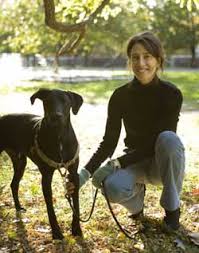 Dog Cognitionist Alexandra Horowitz is back. This time she wants us to know just how well a dog can smell. Did you know they could smell earthquakes? She wants to teach us how to sniff things out just like a dog.
Dog Cognitionist Alexandra Horowitz is back. This time she wants us to know just how well a dog can smell. Did you know they could smell earthquakes? She wants to teach us how to sniff things out just like a dog.
In Alexandra Horowitz's book, Being A Dog, she states that dogs can have up to a billion olfactory receptor cells in their noses. The dogs that have the most are the ones bred over a long period of time for scent work like Bassetts and Blood Hounds. Regardless, all dogs have hundreds of millions more olfactory receptors than humans.
There are two things that dogs can do with many odors that humans can't. One is that they can detect much less of an odor. They also have more types of receptor cells than humans.
To understand this, Alexandra states we have three types of color vision receptor cells that allow us to see all of the colors we see. But say we had ten or a hundred of these color vision receptor cells, we'd see who knows what - but many different kinds of colors that we couldn't even imagine. That is the case for dogs and smells.
We know that dogs can smell some cancers and sniff out drugs, but there is also a mention in her book that some people claim dogs can smell earthquakes. Alexandra doesn't believe any science has been done earthquakes, in other words, you can't control when there is going to be an earthquake and watch all of the dogs' behavior, but some people claim their dogs forecasts storms and earthquakes. This might be because they pick up on changes in the barometric pressure, which would make for a sudden difference in the odors in the air, which a dog would notice. They don't know that an earthquake is happening, but they notice something is different, which has to do with odors.
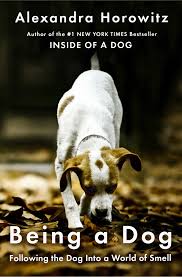 So can we learn from dogs and teach our noses to pick up more scents? Alexandra says definitely! In fact, she was able to do this herself. She states it was her way of becoming more of a dog to see what it might be like to be a dog. She did smell training, which took a lot of practice by sticking her nose in things, bringing things to her nose, sniffing intently and trying to recognize a scent or at least put a word or association to it so that next time she would recognize it more quickly. Alexandra says you need to sniff like you mean it and repeat!
So can we learn from dogs and teach our noses to pick up more scents? Alexandra says definitely! In fact, she was able to do this herself. She states it was her way of becoming more of a dog to see what it might be like to be a dog. She did smell training, which took a lot of practice by sticking her nose in things, bringing things to her nose, sniffing intently and trying to recognize a scent or at least put a word or association to it so that next time she would recognize it more quickly. Alexandra says you need to sniff like you mean it and repeat!
How do cats' sense of smell compare to dogs? Alexandra states that cats do have pretty acute olfaction too, but they aren't trained typically as detection cats. There are a lot of reasons for this, one being that they might not be as cooperative. However, it is really the long snout of a dog that gives them their acute sense of smell. As air is rushed up their nose, it is warmed and humidified, the bad stuff is filtered out and it makes it more likely that when they inhale something, it is going to get all the way to the back of the nose where the receptors are.
Alexandra believes that to a dog there is no such thing as "fresh air," and that every breath of air is loaded with information.
Visit Website
Pet Adoption Tour
Susan Sims, 13th Annual Fido Friendly Get Your Licks On Route 66
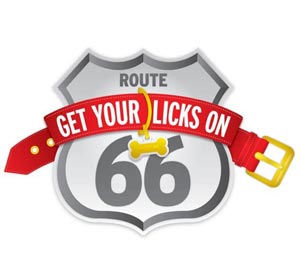 It's time again for the 13th Annual "Get Your Licks on Route 66 Adoption Tour." Fido Friendly publisher Susan Sims started the nationwide journey in Sedona, Arizona and will continue across Route 66 through October stopping at shelters along the way to support adoption events through October. The annual tour has successfully worked with local animal shelters across the country to find forever homes for over 14,000 pets in the last 12 years.
It's time again for the 13th Annual "Get Your Licks on Route 66 Adoption Tour." Fido Friendly publisher Susan Sims started the nationwide journey in Sedona, Arizona and will continue across Route 66 through October stopping at shelters along the way to support adoption events through October. The annual tour has successfully worked with local animal shelters across the country to find forever homes for over 14,000 pets in the last 12 years.
"We are so excited about this year's tour," Founder Susan Sims, Publisher of FIDO Friendly Magazine, said. "After all that we have been through during COVID-19, this tour is going to be special. We can't wait to help participating animal shelters find forever homes for their homeless pets and through our prize wheel, raise money for the individual shelters."
Stop by their events to spin their giant spinning wheel filled with prizes provided by their sponsors, where a donation gives you a chance to win fabulous prizes and all proceeds go to the shelter at the end of the day.
Thanks to their sponsors who have signed up thus far to help us save lives, one shelter at a time! Please visit their websites to see the great products they have to offer: Zymox, Catit, MyPlaceHotels, Sure Petcare, HomeAgain, Embrace Pet Insurance,Tito's Vodka, Brutus Bone Broth, Dog TV, Buddy Belts, HandsOn Gloves and KOA Campgrounds.
Thanks also to the Spinning Wheel Sponsors: Shed Defender, 5Strands Affordable Testing, Bark Potty, CBD Living, John Paul Pet, Licks Pill Free, Suitical, Suzies CBD Treats, Charlee Bear, Pet's Best Life, Petcurean and Bike Tow Leash.
 Their remaining tour schedule is as follows:
Their remaining tour schedule is as follows:
LAST EVENT! Thanks to all of our sponsors who made this trip possible.
Oct. 9: Nebraska Humane Society, Omaha, Nebraska, Event held 11-3, Nebraska Humane Society, 8929 Fort St., Omaha, NE
Please check back often for updates and even in you are not planning on adopting an animal, come out for the fun and spin the wheel for prizes!
http://www.fidofriendly.com
What's Your Vet-iquette - How to Be a Good Veterinary Client - Dr. Debbie
 Sure you think your vet visits go off without a hitch, but do you know how to be a good veterinary client, the kind veterinarians rave about? Follow these suggestions to participate as a vital part of your pet's medical care, to ensure your pet gets the most efficient care, and to always be greeted with beaming smiles.
Sure you think your vet visits go off without a hitch, but do you know how to be a good veterinary client, the kind veterinarians rave about? Follow these suggestions to participate as a vital part of your pet's medical care, to ensure your pet gets the most efficient care, and to always be greeted with beaming smiles.
Be Prepared
Before you arrive at the office with a sick pet, know your pet's ins and outs. Without a pertinent history from you, your veterinarian may need more diagnostic tests to sleuth out the answer to the problem. That takes time and can cost you more in veterinary bills.
Expect the questions your vet is likely to ask you. Has your pet been eating? What types and brand of food do you feed him? Is there diarrhea or constipation?
Bring Evidence
Nothing is more useful to your veterinarian as seeing something with her own eyes. Bring evidence like stool samples, vomited material, and medications your pet is receiving. Has your pet chewed on some unusual plant in the backyard? By all means bring a sprig of that plant.
Document video on your smart phone. This can be immensely helpful to your veterinarian to witness behaviors that may be intermittent. I've been thankful when owners bring smart phone video of seizures, separation anxiety behaviors, and respiratory ailments.
Video eliminates misinterpretation by pet owners, and can permit a quick veterinary diagnosis. Vomiting and regurgitating may look similar, but are caused by different disorders. Pets strain to defecate with both diarrhea and constipation. Inspiratory wheezing, coughing, congestion and reverse sneezing are often described similarly by owners.
Trust Valid Resources
By all means do your research in advance of your veterinary visit. Know what questions to ask. But remember that the internet is abounding with both good and blazingly incorrect information, some based on opinions and conjecture without any sound medical basis. Pet owners who value Dr. Google's opinion over their veterinarian, who has examined their pet, could put their pet's health care in jeopardy.
Confine Your Pet
Make sure your pet is secure before entering the veterinary hospital. Don't underestimate the unpredictable things pets do in a noisy, crowded waiting room. Birds fly off shoulders landing in snack zone of nearby dogs. Dogs instigate fights, and cats flee the waiting veterinary staff's arms. Pay attention to where your pet is and don't allow your pet to approach other animals without the owner's consent. Some animals are there because they are sick, and could bite in unfamiliar surroundings.
Dogs should be on a secure leash. Flexi leashes are dangerous in the veterinary hospital allowing dogs to bolt quickly toward another dog, or to entangle limbs of humans or other animals in the waiting room. Cats and exotic pets should be secured in an appropriate pet carrier.
If you have a pet that has been or could be aggressive to veterinary staff...absolutely share that information before the visit starts. Veterinarians look out for the safety of people in their employment and appreciate a heads-up in advance to avoid potential staff injury.
 Optimize Your Face Time
Optimize Your Face Time
So now you are in the exam room with the doc, so make the most of it. Put the cell phone away and, by all means, don't waste time taking a phone call if medical staff is standing in front of you.
Avoid distractions that will limit your ability to communicate with your veterinarian. This might include a roomful of boisterous children or other pets. If possible, arrange child care or pet sitting so your sick pet gets prime attention and you don't miss any details of the visit.
Emergencies Happen
At the vet office, we recognize how valuable pet owner's time is and try to minimize the wait. But recognize that emergencies are unforeseen and create delays for other pet owners. Most folks understand that emergencies happen and are accommodating during situations as this.
But making a scene or outburst about your wait time, while the veterinary staff tends to a critical pet is just inconsiderate. Recognize that one day your pet could be in that same place and you would be appreciative that your pet's medical emergency was triaged ahead of the waiting routine appointments.
Don't Attack the Messenger
Emotions can run high when you have a sick or injured pet, but it isn't an excuse to be abusive to hospital staff. Obscene language and overly aggressive behavior doesn't help your pet get the care she needs, nor does it endear yourself to those people working hard for your pet's health.
Own Your Own Reality
Pet owners have the daunting responsibility for the health and well-being of pets in their care. That means accepting the level of veterinary care you can pursue, and recognizing choices if finances are limited. Pet insurance can help defer the cost of veterinary care, but there isn't government sponsored Obamacare for pets.
Don't blame your veterinarian for your pet's health maladies, or expect her to cover the costs of treatment. People in the veterinary field do what they do because they love animals, but they shouldn't be expected to take financial responsibility for everyone's pets. I once heard a veterinary colleague respond to an client's question, "Doc, why can't you just do my Sasha's surgery for free?" His response was, "Because my staff needs to get paid and my kids need shoes." Recognize that veterinary offices aren't lending institutions, but rather are small businesses with pressing bills, just as anyone.
Share Your Feedback
Share feedback with the hospital management about service excellence or shortcomings. Every hospital appreciates the opportunity to improve, or the chance to pat staff on the back.
Featured veterinarian known as "Dr. Debbie" on national pet radio program, Animal Radio. Ebook author of "Yorkshire Terriers: How to Be Your Dog's Best Friend"; "Pugs: How to Be Your Dog's Best Friend"; "Mini Schnauzers: How to Be Your Dog's Best Friend"; and "Shih Tzu: How to Be Your Dog's Best Friend." Dr. Debbie's books.
Visit Website
Seven Cat Facts To Make You A Cat Fanatic
Robert Semrow, Animal Radio Listomania
 So I have a number of friends who are cat crazy and I mean that in a positive way. They know so much about cats that it's more than a passion, it's an obsession. And if you are going to have an obsession, being a Cat Fanatic is probably one of the safer obsessions around. One of the things my cat friends like to do is try to amaze me with cat facts. My recent inquisition in front of my cat people made me realize that there are some really cool cat facts that most of us don't know.
So I have a number of friends who are cat crazy and I mean that in a positive way. They know so much about cats that it's more than a passion, it's an obsession. And if you are going to have an obsession, being a Cat Fanatic is probably one of the safer obsessions around. One of the things my cat friends like to do is try to amaze me with cat facts. My recent inquisition in front of my cat people made me realize that there are some really cool cat facts that most of us don't know.
So I'm going to share 7 Cat Facts To Make You A Cat Fanatic.
To begin with, cats have beautiful smiles, when they show them to you. If you were fortunate to catch a look inside at their chompers, you'd see approximately 30 teeth in an adult cat. That's a lot of teeth for such a small area.
If you find yourself trying to herd a Clowder, you are most likely going to be very frustrated. What's a Clowder, well, it's a group or cluster of cats. Also, don't forget that cats start their lives as part of a Kindle, which used to mean a group of kittens, though many of you probably thought of something much different.
Here's a gem for all of you who wonder why that cat stuck up in a high place will descend backwards, instead of head forward. It's because cat's claws are all permanently point in one way. To grip, they must descend backwards. So firefighters and superheroes take note, if the cat is facing forward, it's not about to come down from it's perch, unless it's doing it with a leap of faith.
Speaking to baseball fans, if you call for a lefty from the cat bullpen, you are probably signaling for a male as males tend to be left-pawed and females tend to be right-pawed.
 Cat's are sometimes described as twitchy, which may have something to do with how fast their hearts are beating, as a cat's heart beats nearly twice as fast as a human heart, between 110 to 140 beats a minute.
Cat's are sometimes described as twitchy, which may have something to do with how fast their hearts are beating, as a cat's heart beats nearly twice as fast as a human heart, between 110 to 140 beats a minute.
Cat's whiskers are more than decorative and beautiful, they are functional and help cats detect objects and navigate in the dark. Interesting side note is that Cat Whisker Fatigue is a real thing and can lead to avoidance of coming in to contact with objects that brush irritate their whiskers. So if you are putting your cat food in a deep bowl, and your cat is avoiding it, they might be showing their whisker fatigue.
Finally, and if your dogs are listening to this you may need to turn this up, cats have better hearing than dogs! Cats hear higher frequencies than humans and dogs and can pinpoint a sounds origin with extreme accuracy. I guess I should stop muttering things under my breath since they are likely to hear it anyway!
All joking aside, cats are animal world superstars with so many special and unique things; it's easy to see why the Internet is filled with cat videos. Cat Fanatics, share your favorite cat facts on our Animal Radio Facebook Page.
Visit Website
The Dogfather's Grooming Tip with Joey Villani
Remove Urine Smell From Dogs
 As our dogs age and become seniors, they often become incontinent and urinate on themselves. This odor can be very strong and hard to get out and if you have a white dog you may also see some staining.
As our dogs age and become seniors, they often become incontinent and urinate on themselves. This odor can be very strong and hard to get out and if you have a white dog you may also see some staining.
While you might not be able to remove 100-percent of the odor, there is an easy to fix to remove most of it by neutralizing the odor.
One of the best odor removers that you can use is white vinegar. White vinegar neutralizes uric acid and breaks it down.
Start by bathing your dog like you normally would. Next make a mixture of a gallon of water to one-quarter cup of white vinegar. Distilled water works better than tap water, as some tap waters contain minerals that will discolor a light-colored dog.
Next, saturate the area on your dog by spraying it with this mixture. Work it in and then towel dry your pet. Be aware that some pets may become a little bit sensitive to this. If you notice that their skin becomes a little irritated, dilute the mixture by adding a little more water the next time you use it.
You will notice almost immediately that the smell is almost gone. You may be left with a strong vinegar smell, but this smell will go away as the pet dries.
Animal Radio News - Lori Brooks
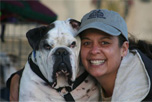 Pet Vet Bills Are Through The Roof
Pet Vet Bills Are Through The Roof
If you feel like your pet's vet bills are through the roof, you're not alone! It seems the animal health care system suffers from many of the same problems as human medical care, according to a report from researchers at Stanford and the Massachusetts Institute of Technology. They found that some features of the systems are shockingly similar, in that both have seen a huge increase of dollars spent on end-of-life care. There is no denying that we are usually more than willing to shell out a piece of our savings to keep our furry friends healthy. According to the American Pet Products Association, pet owners in the U.S. spent over $31 billion on veterinary care last year and that spending on pets' medical bills has outpaced that of humans. Between 1996 and 2012, data from the Consumer Expenditure Survey shows the percentage of physicians jumped by 40-percent, while the number of veterinarians nearly doubled. Still, fewer than 1-percent of pet owners purchase a pet health insurance policy.
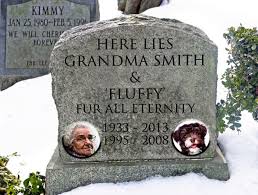 You Can Be Buried With Your Pet in NY
You Can Be Buried With Your Pet in NY
Pet owners in New York can take their trusted furry companions with them to the grave since the governor has signed legislation making it legal for the cremated remains of pets to be interred with their owners at any of the approximately 1,900 not-for-profit cemeteries in New York that are regulated by the state. The law, which does not apply to cemeteries owned or operated by religious associations or societies, comes three years after the state made it permissible for pet cemeteries to accept the cremated remains of humans wishing to spend eternity with their pets. Supporters of the measure cited statistics showing that 62-percent of U.S. households have a pet. Among the most famous Big Apple pet owners who wanted to be buried with their pets was Leona Helmsley, the hotel magnate dubbed "The Queen of Mean" who died in 2007 and had in her will that she wanted her pampered pooch "Trouble" interred with her in the 12,000-square-foot family mausoleum. When Trouble died, there were no laws in the state that allowed them to be buried together.
Should I Let My Pet Sleep With Me?
If you kick your dog off the bed every night, you might want to stock up on apology treats. A study of 150 people conducted by the prestigious Mayo Clinic on Sleep has found that, contrary to popular belief, sleeping with your pet doesn't actually disrupt your sleep as much as you might think. In fact, it offers people a sense of security, helping them get a better night's sleep. Twenty percent of those in the study said their pets disturbed their sleep, but 41-percent believed having a pet in the bedroom actually helped them sleep better. The authors of the study said, "Some people find that sleeping with their pet actually helps them feel cozy." An interesting finding was that most people who complained about pets disturbing sleep lived with multiple pets.
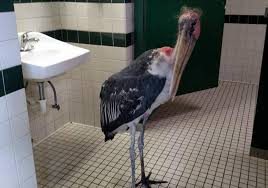 Storks Ride Out Hurricane in Public Restroom
Storks Ride Out Hurricane in Public Restroom
Storks at a zoo in Florida found refuge in a bathroom as a hurricane Matthew passed through the area. St. Augustine Alligator Farm Zoological Park shared photos as their staff attempted to assure that all of the facility's animals were kept safe indoors from the hurricane. One photo with the caption, "No species discrimination in this bathroom!" showed a marabou stork standing on the tiled restroom floor between a sink and an open stall door, as it waited for the storm to pass. It was a pretty tough job for the park, as every bird and mammal was moved to safety indoors. All venomous snakes had to be double contained, tortoises and baby crocs were moved indoors in various sized tubs and the storks got to ride out the storm in the park's public restroom.
Is Your Pet Insured?
More than one million dogs and cats in the U.S. are insured. However, that is less than 2-percent of the total number of dogs and cats nationwide, according to Pets Best Insurance Services State of the Pet Insurance Industry Report. They found that more than 82-percent of pet insurance customers reported that they consider themselves "pet parents," rather than simply "pet owners," which speaks to the human-animal bond and how Americans' relationships with pets has evolved over the past few decades. Pets are truly considered members of the family, not simply "the family pet." A notable trend they're seeing among customers is that the fastest growing age group is now 25 to 34-year-old millennials. This increasing trend among millennials might speak to another finding in the study, which shows that more than half of pet insurance customers, 52-percent of them, do not have human children. Seventy-eight percent of pet insurance customers are female, which aligns with the growing trend of young women choosing dogs over motherhood. Now the really good news, the report found that 40-percent of pet insurance customers adopted their pet from a shelter or rescue, with another 6-percent taking in pets they found as strays. The study also found that pet owners with insured animals visit their veterinarian more often.
 Do You Believe in Animal Afterlife?
Do You Believe in Animal Afterlife?
A study to systematically explore beliefs about animal afterlife was published, showing around 70-percent of U.S. households owning pets,. The study marks an insight into a largely unexplored area of American spirituality. The authors surveyed 800 participants, examining how demographic factors including sex, race, age, geographic region, religious beliefs and pet ownership all affect an individual's beliefs about animal afterlife. Results showed that people who believe in an afterlife for humans are substantially more likely to believe in an afterlife for animals. Fifty-nine percent of participants believed in human afterlife and 75-percent of those individuals also believed in animal afterlife. The survey further indicated that members of certain demographic categories are more likely to believe animals have a life after death. Women, American Indians, African Americans, Buddhists, residents of the South and pet owners are all more likely to believe in animal afterlife. They also found people held different beliefs for different animals. In general, dogs, cats, and horses were rated the most likely to experience an afterlife, whereas insects, fish, and reptiles were rated the least likely.
 Listen to the entire Podcast of this show (#1140)
Listen to the entire Podcast of this show (#1140)





